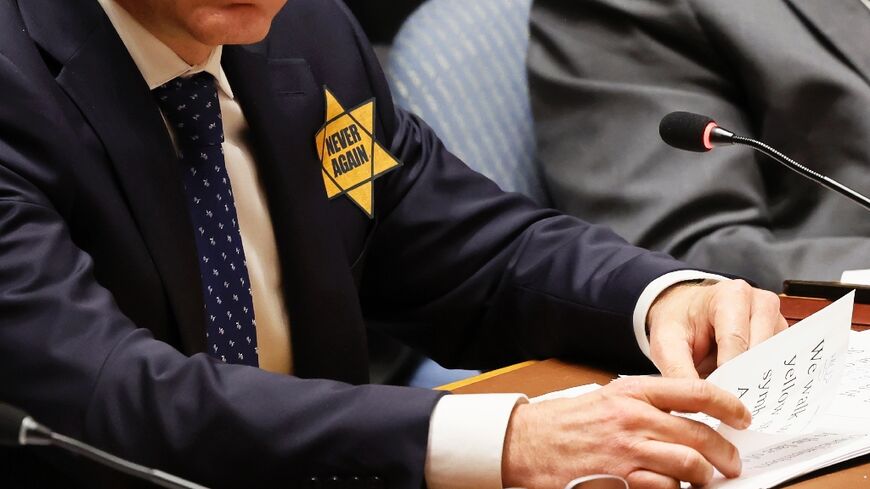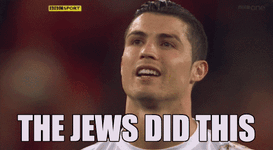You are using an out of date browser. It may not display this or other websites correctly.
You should upgrade or use an alternative browser.
You should upgrade or use an alternative browser.
The Jewish Question (JQ)
- Thread starter Ember
- Start date
That guy was on a roll even after his time was up as he continued to rattle off a list of (((who's who))).
Another chicken coming home to roost moment. No doubt a lot of these people at the protests are in the country are there because of policies Jews have pushed
'You can fool some of the people all of the time, and all of the people some of the time, but you can not fool all of the people all of the time' -- Abraham Lincoln
Cross post via The Arab-Israeli thread.





Israel envoy wears yellow star at UN
Israel's United Nations ambassador displayed a yellow star on his chest Monday as he addressed the Security Council, provocatively pledging to wear the badge until members of the body condemn Hamas "atrocities."
"Some of you have learned nothing in the past 80 years. Some of you have forgotten why this body was established," envoy Gilad Erdan said, as he denounced the Security Council for "staying silent" over the unprecedented deadly attacks by Hamas Palestinian militants against Israel on October 7.
The deeply divided 15-member council has not adopted a single resolution on the three-week-long war between Israel and Hamas.
"So, I will remind you. From this day on, each time you look at me you will remember what staying silent in the face of evil means," the ambassador said.
"Just like my grandparents, and the grandparents of millions of Jews, from now on my team and I will wear yellow stars," he said, standing up to affix one on the breast of his suit inscribed with the words "Never Again," in reference to the yellow stars Jews were forced to wear by the Nazis.
But Erdan will wear it "as a symbol of pride," he said.
"We will wear this star until you wake up and condemn the atrocities of Hamas."
Israeli Prime Minister Benjamin Netanyahu has called the October 7 attacks the worst against the Jewish people since the Holocaust.
For weeks the Security Council has been riven by divisions over the war and its impact, rejecting four draft resolutions about the conflict.
Some texts were blocked by the United States, a close Israel ally, because they did not mention Israel's right to defend itself.
Another presented by the Americans was stymied by Russia and China in particular because it did not clearly call for a ceasefire.
In light of the impasse, the UN General Assembly last Friday adopted by a large majority a nonbinding resolution requesting an "immediate humanitarian truce," but not mentioning Hamas.
Israel, through Erdan, blasted the text, saying it will "go down as infamy."
During Monday's Security Council meeting, several speakers, while denouncing the Hamas attacks, highlighted the price paid by inhabitants of Gaza, where health officials say more than 8,300 people have been killed in the Hamas-run Palestinian territory.
Philippe Lazzarini, head of the UN agency for Palestinian refugees, or UNRWA, said the siege of Gaza amounts to collective punishment of its residents.


Marvel's Israeli Superhero Poses Huge Headache for Disney
At last year's D23 expo, Disney announced a new character would be joining the Marvel Cinematic Universe—Israeli superhero Sabra.
Debuting in 2024's Captain America: New World Order alongside Anthony Mackie, Sabra's inclusion has been divisive from the start. However, the Israeli-Palestinian conflict has deepened the issue and created more potential pitfalls for the studio.
On October 7, the Palestinian militant group Hamas launched a surprise attack on Israel, which subsequently fired airstrikes on Gaza. At least 1,400 people have been killed in Israel as of October 30, while more than 8,000 have been killed in Gaza, according to the Associated Press.
"The Sabra character, when juxtaposed with Captain America, unavoidably amplifies nationalist and political ideologies and convictions, and could inadvertently exacerbate tensions in the Middle East," Deepak Sarma, professor at the College of Arts and Sciences at Case Western Reserve University in Cleveland, told Newsweek.
Can the controversial character be portrayed in a way that doesn't ruffle feathers?
Who is Sabra?
Sabra first popped up in The Incredible Hulk in 1980. A mutant with enhanced strength and speed, the character is also an agent for Mossad, the real-life Israeli secret service. Her real name is Ruth Bat-Seraph, while the codename Sabra means "a person born in Israel."
In Captain America: New World Order, Sabra will be played by Shira Haas. The 28-year-old Israeli actress is best known for starring as Esther Shapiro in the Netflix mini-series Unorthodox, which focuses on a Hasidic Jewish woman who moves abroad to escape an arranged marriage.
Sabra was originally envisioned as an Israeli counterpart of Captain America, and in early editions, the Jewish superhero wore a white bodysuit emblazoned with a blue star of David. She is trained in hand-to-hand combat and has the power to help others heal more quickly.
"Of course, Sabra would be considered offensive by Palestinians, Arabs, Muslims and their supporters given the complexities of nationhood and nationalism in the Middle East," Sarma said. "But the current conflict heightens tensions significantly."
Eliza Jane Schneider, a voiceover artist and activist whose Freedom of Speech project gives voices to diverse backgrounds, agrees.
"It's potentially offensive, because spotlighting an Israeli superhero, specifically an Israeli intelligence anti-terrorist, on this global scale, with the wide reach that Marvel has, risks further polarization," she told Newsweek.
"It could be seen as Marvel and the United States supporting and aggrandizing Israel's policies."
Why is an Israeli superhero so controversial?
In her first appearance, Sabra attacks The Hulk, whom she believes is assisting an Arabic militant group. When a Palestinian boy is caught up in the battle between Sabra, The Hulk and the terrorists, then dies, The Hulk declares: "Boy died because boy's people and yours both want to own land! Boy died because you wouldn't share!"
Of course, the long-running conflict between Israel and the Palestinians is significantly more complicated than that, and is just one reason why the source material is controversial.
Although the death of the Palestinian boy supposedly leads to a more compassionate Sabra, the transformation doesn't last for long. Throughout her tenure, Sabra holds negative views toward Arabic characters, including fellow superhero Arabian Knight, whose stereotypical portrayal comes with its own issues.
In the comic New Warriors (1995), her motivations are somewhat retconned and less nationalistic, with the character supposedly disliking Palestinians because her son was killed in a terrorist attack.
Throughout her comic appearances, Sabra's commitment to the Israeli government and Mossad doesn't waver. During one particularly grueling battle with Sabra, The Hulk thinks to himself: "I'm not fighting a woman. I'm fighting the Zionist recruiting board."
Sabra's nationalism is not unique in Marvel comics. The 1960s introduced readers to Red Guardian—the communist Russian version of Captain America, played by David Harbour in Black Widow (2021)—while other cultural counterparts include Captain Britain, who was gifted magic powers by King Arthur's sorcerer pal Merlin.
According to Schneider, Marvel could give Sabra the same treatment it gave Red Guardian, fleshing her out into a more complex character that doesn't rely on stereotypes.
"Perhaps this is an opportunity for a character to experience life and love from both sides of this conflict," she said.
"Filmmakers could make it unclear throughout the first three-quarters of the film which side our beloved, nuanced, flawed but altruistic new superheroine is on—question her own allegiances, swayed more by universal love and desire to protect all children and civilians on both sides of the conflict, thereby acknowledging the inherent value of human life across groups."
Sabra controversy is not new
Sabra was already a controversial character in the 1980s, but the current fighting has put the Israeli-Palestinian conflict front and center once again, making her inclusion in the upcoming movie even more divisive.
"It is not hard to imagine protests at movie theaters or even the banning of the film in Arab or Muslim countries," Sarma said.
To offset the character's contentious history, Schneider hopes Disney will explore Sabra's positive attributes, along with developing her relationship with the Israeli government and Palestinians.
"Sabra has the ability to transfer her life energy to other people, the ability to grant superpowers to other people, and regeneratively heal," she said. "She is in a perfect position to promote love, forgiveness, humanity, peace and positive change."
Can someone give me the cliff notes on what the Jews are attempting to accomplish? I can't recall the Zionist plan, was it the Kalergi plan? Would be much appreciated. I have been talking to my wife about this recently but I am finding I don't have enough understanding to give her direction.
Surprised to see that this is still up. Check it out before it gets removed:Can someone give me the cliff notes on what the Jews are attempting to accomplish? I can't recall the Zionist plan, was it the Kalergi plan? Would be much appreciated. I have been talking to my wife about this recently but I am finding I don't have enough understanding to give her direction.
Surprised to see that this is still up. Check it out before it gets removed:
The algorithim is stronger than I thought - after searching for the above, I'm already getting items to the contrary on my feed, and I'm not even logged in. The Feds are coming for me guys!
Their constant hate for Christ, Christianity and Christians is so evident and full of irrationality and disrespect. It's just mind boggling.
They also use C.E. instead of A.D. (Anno Domini). It's just sickening.








